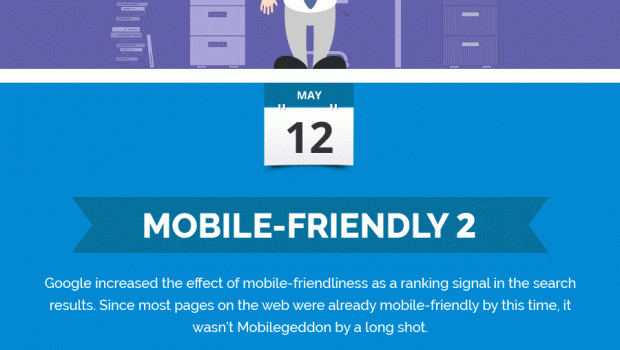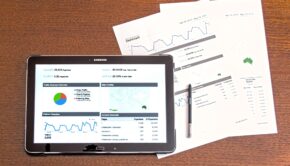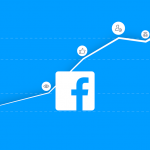Google’s biggest algorithm updates in 2016 [Gifographic]
2016 saw its share of algo updates right from the beginning of the year. The GIF below shows you what Google was up to last year as far as its ranking algo is concerned.
The unconfirmed algo update at the beginning of the year saw major shifts in SERP rankings. Google refuted speculation that this was a Penguin update and also dismissed suggestions that this was due to integration of Panda as a core ranking signal, but volatility in rankings was widely noticed.
The AdWords update of February 23rd changed the placement of ads and made it even more competitive for advertisers to bid for high-value keywords. The right column ads disappeared from SERPs and the there are now four ads in the ad block above organic search results. SEOs were disconcerted on seeing their sites pushed further down, with results appearing below the fold even on desktops. The update made bidding for valuable AdWords highly competitive and improved user experience by reducing the overall number of ads.
The next update to be rolled out, virtually the next day, strived to make searches mobile-friendly with pages using the AMP coding appearing in special places and/or with special AMP ‘lightning’ symbol. Accelerated Mobile Pages are stripped-down versions of the original pages that load fast and follow the standards set by the Google-backed AMP project.
The Possum update of September 1st caused major movement in local or Google Maps results. When you search for a local business, say carpet cleaning services in your city, the Local Finder or Google Maps results throw up the names and addresses of cleaners near you. If a business fell on the fringes of the physical city limits, it rarely ever made it to the results first page. But after the Possum update, many such businesses did. This is because the update widened the physical city limits, removed spam and duplicate listings, triggered results based on the location of searchers, and made local filter more independent of the organic filter.
The universal results shakeup of September 13th dropped almost 50% of image results from organic search result pages. This freed up an organic position in the first page of search results and caused much volatility in rankings.
The Penguin. 4 rollout was completed in several phases beginning with the September 23rd update. Penguin is now a part of the Google core ranking algo and applies in real time. Entire websites are no longer penalized for spammy content, and only the bad links are devalued. As Penguin works in real time, you can expect your devalued pages to be ranked as soon as you have removed spam/poor content from them.
There were other unconfirmed updates also towards the ends of the year, but no noticeable pattern was picked up.

















